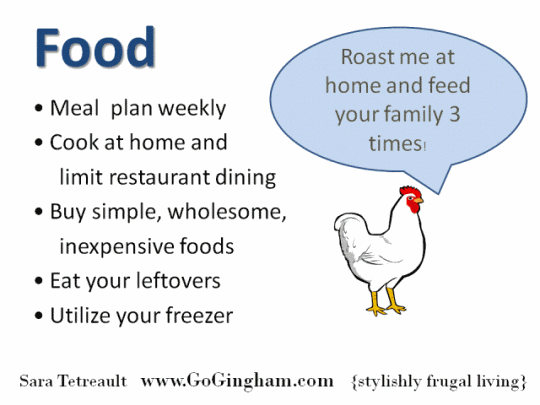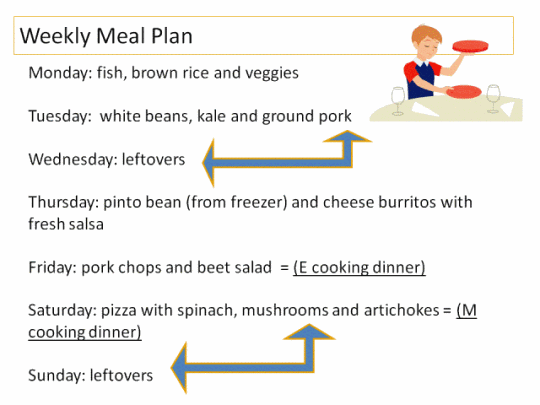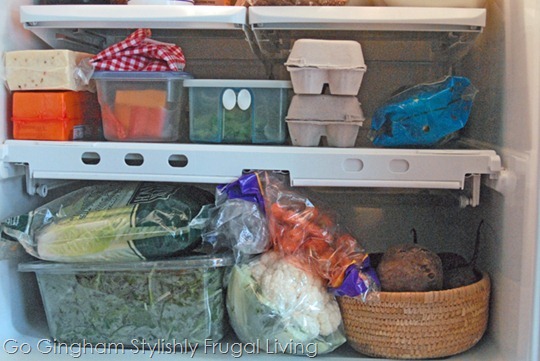This is the first in a series of money saving strategies for reducing your FAITH expenses. FAITH = food, apparel, insurance, transportation, and housing.

We all need to eat every day – several times a day. Reducing the amount of money spent on a food budget begins with a plan. There are really 5 easy steps to reducing your food budget:
Reducing FAITH Expenses: Food
- Plan
- Cook
- Buy
- Eat
- Freeze
Don’t you just love how there are only 5 easy steps involved?
1. Plan
Yes, a plan to cook wholesome, non-processed meals at home. Yes, a weekly meal plan (you knew I was going to start with this, right?) If you have a plan you eat healthier and less expensively at home. (If you need more reasons to meal plan, I came up with 11 reasons.)
Families in the U.S. throw out approximately 25 percent of the food and beverages we buy. That’s an estimated annual cost of $2,275 or more for a family of four, writes Jonathan Bloom. In his book, “[amazon_link id=”0738215287″ target=”_blank” container=”” container_class=”” ]American Wasteland: How America Throws Away Nearly Half of Its Food[/amazon_link],” Jonathan shares about why we waste food, what we can do about it, and why it matters.
Combat the food waste problem at your home by meal planning, first, before you grocery shop. Review what’s in the freezer or pantry so you’re not buying food items you already have. Buying only the food that you and your family will eat for a week will keep your food costs lower, too.
A long-term benefit to eating wholesome, real foods? You’ll be in better health. This will save you money in the long run on health care costs. Don’t forget, planning ahead means you minimize trips to the grocery store which is a time and resource saver as well.
If you cook at home every night, you must be wondering when you’ll have a night off in the kitchen? Well, here’s the secret: assign a night once-a-week for your kids to cook for the family. They need to learn these skills anyway, so why not teach them and then put your feet up?
Below is an example of a weekly meal plan from our family. It’s not glamorous or fancy, but non-processed, wholesome foods that are also easy to cook and make quick meals that taste great, make it easy to eat well and save.

2. Cook
Learn to cook. That’s it. If you can read and follow directions, you can cook. Learn a few basic meals and what food items to keep on hand – pantry, refrigerator, and freezer staples. With an arsenal of a few simple meals, you can pick one day to cook dinners and freeze them for later eating. And, don’t forget, if you learn to cook well and cook something tasty the first night, you’ll want to eat your leftovers the second night.
If you really want to get serious about reducing your food costs, take a break from restaurant dining. This isn’t easy if you’re used to dining out. How about starting with packing your lunch for work as a small step to start with? Small, incremental changes are ones that stick.
3. Buy
Buy what’s on your grocery list. Skip the impulse purchases and only go to the store with a list that you’ve made from your meal plan.
Need a meal plan PDF? Here’s what I have hanging on our refrigerator: Weekly Meal Plan
Buy simple wholesome, inexpensive non-processed foods and buy from the bulk bins if possible. Save more time and skip the coupons and opt for simple, wholesome ingredients instead. Coupons are generally for processed food, which is expensive and not quite as good for your health.
Always be careful to check unit prices. Just because something is “on sale” or “family size” doesn’t mean it’s the best price. Look at the per unit price and know the prices of the food you buy to make sure it’s really the lowest price.
Beans are a favorite way of mine to save money in our food budget. By only buying beans from the bulk beans and not canned, we have saved over $500.00 on our food bill, in one year! Yes, we eat a lot of beans but they’re good for you and taste great when cooked with onions and garlic. Cook beans ahead of time, freeze them in portion sizes, and have quick, healthy meals ready in no time.

4. Eat
Eat at home and learn to love your leftovers. If you meal plan, you’re not cooking every day and you’ll find a night or two of leftovers will become your best friend. Choose one day a week to do lots of cooking and have “homemade” prepared meals ready to enjoy.
When’s your busiest time of day? If it’s after work and you don’t feel like cooking when you get home, wouldn’t it be great to have a several homemade prepared meals ready to serve?
Reduce your food costs even more by not going out to eat at restaurants. If restaurant dining is part of your regular routine and hard to give up, try not going out to eat for 1-week. Or, instead of dinner out at a restaurant for a date, go out to lunch instead. It’s still a meal out and almost always costs less than dinner.
We skipped going out to dinner as a way to save money for our home exchange trip to Spain last summer. By not going out to dinner, we had money to pay for airline tickets. Not a bad trade off…
Packing food for lunches, picnics, and outings is another helpful way to save on food costs.
5. Freeze
Utilizing freezer space can really keep food from being tossed out, especially if you have a large freezer. Keep a close eye on what you have to try and freeze your food before it starts to go bad. As far as I know, the only food items that can’t be frozen are raw eggs in the shell. Because food expands as it freezes, eggs in the shell have no where to go. (Also, I just froze some sour cream. It tasted fine, un-thawed, but the consistency became runny).
Another great way to use food from the freezer is to grow your own vegetables or pick from a local farm and freeze for later use. Take advantage of the lower prices of vegetables and fruit when they’re in season and freeze them.
We all have to eat several times a day but with a little planning and cooking at home, you’ll find yourself eating at home more often. By only buying the food that’s on your grocery list, you’ll save not just money in your food budget but resources and time as well.
What are your tips for reducing food costs? How do you reduce food waste?
Go Gingham related links:
Grocery shopping from the bulk bins and food storage containers
Pantry basics for the home cook – what’s in my pantry
Refrigerator basics for the home cook – what’s in my refrigerator
How we keep food waste to a minimum
More related links:
The Environmental Working Group (EWG) is an online resource for healthy food and eating. Their helpful booklets are available in PDF formats and listed below. They have many simple, healthy cooking tips, tricks, and recipes.
From The Washington Post on food waste can be found here: “In U.S. Food is Wasted from Farm to Fork“
Great, great article Sara!! We all know most of the basics, but when seeing it so well put together, it makes one motivated 🙂 I have recently learned to freeze food the proper way.
I am one of those who cooks every night, even thrice (breakfast, lunch, dinner) if my FIL or my parents are visiting. Indians are prone to be this way. Yet we end up wasting food because our older generation thinks frozen food, and stored food, even in refrigerators, is bad food, and you ALWAYS need to eat ‘fresh’. That goes for leftovers too. If we feed ‘leftovers’ to the family, they we are somehow not good homemakers.It drives me nuts, lol! Slowly they are coming around, but it is going to take a heck lot of time. I repurpose a lot of food, and that works out sometimes.
I freeze a lot of my greens, but the only thing that I have no been able to freeze successfully are Zucchini and green beans. Both turn soggy when defrosted and lose their crunch.
LikeLike
Thanks, Minnie! I love your attitude and willingness to continue trying. Well done.
I agree on the freezing of zucchini and have found that either baking with zucchini or using it sauteed over brown rice or pasta works better.
I haven’t tried freezing green beans but would try oven roasting them first and then freezing. We love oven roasting veggies and if you do it first, maybe you can enjoy the taste over the texture. Maybe!!
Good luck and thanks for leaving another comment.
LikeLike
Sara, Thanks so much for this article! We have been working really hard to cut down our food expenses for the past 6 months and I follow all but the “planning” portion of this. There are only 2 of us and so a lot of times I “shop from the pantry” instead of meal planning. It works for us.
I would love to see more about cooking with beans. Beans [excluding green beans] were not used very much in my mom’s cooking so I don’t know a lot about working with them. How do you keep it from becoming boring? It seems like they have such a distinct flavor that no matter how I prepare them they always taste the same and overpower any seasoning.
LikeLike
Cee, I say if it’s working for you then keep at it! Well done.
Beans can be rather boring – try garlic, onions, and chipotle peppers in adobo sauce.
Here are a few links to get you started:
https://gogingham.com/2011/01/chipotle-peppers-adobo-sauce/
and then a weekly meal plan using lots of beans:
https://gogingham.com/2013/03/weekly-meal-plan-52/
and how much you can by using dried beans and not canned ones:
https://gogingham.com/2013/01/why-cook-with-dried-beans/
I’ll have more recipes, too.
Thanks, Cee!
LikeLike
This is one area I really, really need to improve on. Thanks for the tips.
LikeLike
Thanks, Julie! It’s amazing how chipping away at the food budget can really make a difference. I think you’re pretty dialed in to saving money!
Thanks for leaving a comment.
LikeLike
Great comments, Sara! I try and plan, and we do shop off of those plans the best that we can, but my husband (you remember him, don’t you) will occasionally see 1lb of something on the shopping list, and because it’s something that he really likes, he’ll buy a 4lb chunk of it, adding to my prep time. Oh well, such is life. The system really does work – it can be expensive if you let your pantry stores get too low, but generally speaking it’s much less expensive to shop and eat this way!
LikeLike
Thanks, Cathy! Yes, I do know that husband of yours 🙂 and am impressed that he’s doing the shopping.
You are right that letting pantry amounts get too low can be more expensive. It’s smart to start there before making meal plans.
Well done, Cathy. I like your system.
LikeLike
Seems I need to have me some kids! I am a big fan of the leftovers, that’s for sure.
One thing you can’t freeze (from experience) is cooked potatoes – they come out like mush. But anything else, I’ll try (til I fail!)
LikeLike
SarahN, I totally agree – potatoes that have been cooked are very much “mushy” or “gruel” as I’ve heard them described by family members here!
I really like your attitude – “But anything else, I’ll try (til I fail!)”
You can’t beat leftovers for an easy dinner the second night – or lunch or breakfast. We’re dining on split pea soup today for lunch thanks to dinner 2 nights ago.
Thanks, Sarah!
LikeLike
Great ideas. When I worked long, long hours the boxed foods were the mainstay of my existence. I have since had to put that aside for a while because of their high salt content (a family member is on a low, low sodium diet). Step 2 (Learn to Cook) in your article is a major stumbling block for me. Although I can follow directions, nothing works for me. I was not blessed with the “cooking gene.” I have been at it for a long time and have come to the conclusion that I hate to cook since I am so bad at it. There is no hope on that front. I think one has to have passion for it to be good at it. If there were ever to be a contest for the worst cooking, I would be the winner. I can even burn water! Words like blanch, sautee, broil, parch, mash, fold, and many others, are very confusing. All my food is so icky that when it comes to family reunions, I am asked not to bring anything I cook ….. I am not a newbie, just an old poster child for “Cooks are born, not made.”
LikeLike
Sue, your honesty is always appreciated here!
I do agree with you that “Words like blanch, sautee, broil, parch, mash, fold, and many others, are very confusing” which is why I skip many of those – especially the blanching.
Thank you for leaving a comment!!
LikeLike
Great article Sara! I love the way you broke everything down. You’ve inspired me to spend more time cooking and planning my meals for the week.
LikeLike
Rose, I’m so happy to hear that! I wish luck – and as soon as you do it once, you’ll see how easy it is. Can’t wait to read about it on your adorable site!
LikeLike